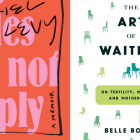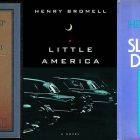Life and Death in Today a Woman Went Mad in the Supermarket

Today a Woman Went Mad in the Supermarket, Hilma Wolitzer’s wonderfully alive story collection published this summer, provides an intimate look at the domestic life of women; the stories—which were written from 1966 to 2020—provide a snapshot of what being a woman, a wife, and a mother has looked like over time. Eight of the stories feature the same two characters, and we experience Paulette, nicknamed Paulie, and Howard’s life through Paulie’s eyes as she gives birth, takes care of her husband, and parents her young children. The final story, “The Great Escape,” reflects our current moment—Paulie and Howard get sick from COVID-19, and Howard dies. “The Great Escape” is the longest story in the book, and it is heartbreaking, especially after seeing the couple at the start of their life together. This is a collection brimming with life and humor, and yet death is ever-present, leading the collection forward to its final, inevitable conclusion.
In “Photographs,” the first story in which we meet Paulie and Howard, we learn that they get married after Paulie gets pregnant through this spectacular opening line: “We were married in those dark ages before legalized abortion.” Paulie’s enthusiasm for life and love is infectious: “When I was twenty, my goal was to lie meshed with Howard forever.” When they get engaged, she says to him: “We’ll have a wonderful life together. We’ll have terrific good luck. I can feel it.” But, as we will see more clearly over time, Howard tends to counter-balance her sunny outlook on life. He hugs her but she feels “the doombeat of his heart and the collapsing walls of his will.” Right from the start, then, life and death are intertwined.
It is difficult, in fact, for Howard not to be her opposite, and if Paulie is full of life then Howard is the one associated with death. This understanding is often the butt of his jokes—in “Mrs. X,” when Paulie tries to get him to stop smoking, he responds, “Ah, who wants to? You have to die from something anyway.” He then seems to consider stopping, and Paulie offers to mirror his effort by trying to lose some weight. Her optimism rushes in: “I am thrilled with the idea of a joint effort. It is like the camaraderie at a block party in the Bronx on V-J Day. The war is over. We are going to live forever.” Wolitzer makes us feel the necessity of the two being together; they represent yin and yang, and it becomes difficult to imagine one without the other.
Howard experiences depression, though, which becomes apparent in “Sundays,” when we see the family leave the city to go look at homes in planned communities in the suburbs. This is a regular outing for them—not one with the intent of purchasing a property, but merely a way for them to work through one of Howard’s down periods. Paulie wakes in the morning full of her usual joy: “Sunny, radiant. I wake with the same dumb abundance of hope every day. The bed always seems too small to contain both me and that expansion of joy.” Howard, though, does not want to get up. He’s unsure of the cause of his depression, but signs of death and decay are everywhere. He doesn’t like when he’s at the ballgame and it rains and “the men pulling the tarpaulin over the infield seem to be covering a mass grave.” While Paulie is making breakfast, he “sits like an inmate in the wintry garden of a small sanatorium,” dropping pages from the New York Times “like leaves from a deciduous tree.”
Paulie is not immune to these thoughts, either, even given her more optimistic take on life. She considers why they are the way they are: “Why am I so happy? It must be the triumph of the human spirit over genetics and environment. I know the same bad things Howard knows. I have my ups and downs, traumas, ecstasies. Maybe this happiness is only a dirty trick, another of life’s big come-ons.” She, too, is always looking forward, towards the end, but she approaches it differently from Howard. As she thinks about the homes they will visit in the suburbs, she considers what this will look like down the road: “Maybe later, when we are older, we’ll visit the Happy Haven and the Golden Years Retreat, to purge whatever comes with mortality and the final vision.” In “Nights,” a story about Paulie’s insomnia, she thinks, “We are all going to grow old. The men will have heart attacks, the women will lose the loyalty of tissue in chins and breasts.” There is humor threaded throughout, often juxtaposed with the threat of loss or death. Even as a small child, Paulie understood the trajectory of life: “I had a dog when I was a child. When it was a few years old, I realized with horror I had established an irrevocable relationship that could only end in death. From this grew the knowledge that death was true of all relationships—friends, marriage.” Later, Howard asleep beside her, she naughtily participates in his war dream, calling out “Die, you bastards” before soothing him, telling him it was only a dream. She thinks then, “But he’ll die anyway. In this bed perhaps. Howard in a coffin. Howard in the earth. Good-bye, Howard.” The story ends with Paulie still awake: “I am the only one here. I am the only one left in the dark world, the only one who cares enough to stay awake the long and awful night.” It is chilling to think of Wolitzer writing this story in 1974, 46 years before writing “The Great Escape.”
We don’t get a chance to see how Paulie and Howard’s relationship develops or to watch their children grow; the seven early stories about Paulie and Howard were written in a short span of time, from 1969 to 1975. In the collection, three stories about other characters are inserted before we get to the final story. There is such readerly joy, then, when the opening line of “The Great Escape” is: “I used to look at Howard first thing in the morning to see if he was awake, too, and if he wanted to get something going before one of the kids crashed into the room and plopped down between us like an Amish bundling board.” We are back with these wonderful characters, Paulie as full of life as ever. Quickly, though, we learn that much time has passed. Now, Paulie is watching in bed to make sure that Howard is breathing. The children have long since moved out. But her optimism remains intact, even as their days consist of pills and doctors’ appointments and arguments: “It seemed as if it would all go on forever in that exquisitely boring and beautiful way. But of course it wouldn’t; everyone knows that.” Death jokes abound. Wolitzer deftly covers the missing passage of time: “in what seemed like only a few long afternoons, he and I turned seventy and then eighty and then nearly ninety.” We are sensing that the end—so often foreshadowed in this collection—is near.
In the spring of 2020, their daughter calls to tell Paulie about COVID-19. Paulie remembers that Houdini and his wife had a deathbed pact with a secret code, so they could communicate after death. She tries to get Howard to create a secret code but he refuses: “Death was his least favorite topic, in any context, and especially at bedtime. So I didn’t share my conviction that there was only one mystery left after a long marriage: Which partner would die first?” In the earlier stories, death is ever-present, but it’s a dark spot in the future. In this story, death is the focus. We have arrived. Paulie talks about rereading books when she was a child “with the stupid hope that it would end differently this time.” We are wishing for the same thing. As always, though, Wolitzer juxtaposes the dark with the light. There’s a hilarious Zoom attempt at a book club. When Howard thinks he’s lost his sense of smell, Paulie holds a jar of Vick’s VapoRub under his nose.
But then it happens. Howard starts coughing and his breathing is labored. His fever spikes. The EMTs arrive to take him to the hospital, and Paulie runs around finding what he needs. The door to the elevator closes in her face. Only then does she think to say what needs to be said. She gets sick, too, but she stays home and slowly recovers while Howard stays in the hospital. He declines a ventilator and signs a DNR, with their daughter assuring Paulie that “he’d been fully aware, that his dread of suffering must have overwhelmed his dread of nothingness.”
And then he is gone. Paulie never actually says this, though. In the early stories, when it was only conjecture, it was easy to speak of death. To joke about it. Now, her granddaughter is having a baby—once again, the juxtaposition of life and death—and she wants to name her baby for Howard, “whom she’d adored.” That is the first indication that Howard has died: Wolitzer uses the past perfect in its truncated form (that “’d”) to indicate that he is gone. It is as though there’s an empty space in the narrative where he belongs, a hole that can only be circled. Later, Paulie thinks, “I hadn’t witnessed any of it and my imagination failed me for once—I couldn’t picture it . . . It was as though he had merely vanished, like a magician’s assistant falling through a secret trapdoor.”
The story and the collection end shortly after this. Everything must come to an end; there is no greater inevitability. Paulie has “become [her] usually garrulous self again, talking and talking about anything and everything.” But she’s doing this, in part, to talk to Howard, to trick him into talking to her, from across the divide. Her goal, after all, all those years earlier, was to “lie meshed with him forever.” They didn’t get there, but they got pretty close. Luckily for us, Hilma Wolitzer has assured they will live forever in each reader’s mind and heart.



